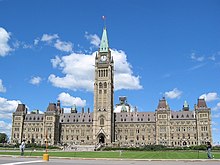| United Nations Declaration on the Rights of Indigenous Peoples Act | |
|---|---|
 | |
| Parliament of Canada | |
| |
| Citation | S.C. 2021, c. 14 |
| Passed by | House of Commons |
| Passed | May 25, 2021 |
| Passed by | Senate |
| Passed | June 16, 2021 |
| Royal assent | June 21, 2021 |
| Commenced | June 21, 2021 |
| Legislative history | |
| First chamber: House of Commons | |
| Bill title | Bill C-15 |
| Introduced by | David Lametti, Minister of Justice |
| First reading | December 3, 2020 |
| Second reading | April 19, 2021 |
| Third reading | May 25, 2021 |
| Second chamber: Senate | |
| Bill title | Bill C-15 |
| First reading | May 25, 2021 |
| Second reading | June 3, 2021 |
| Third reading | June 16, 2021 |
| Status: In force | |
The United Nations Declaration on the Rights of Indigenous Peoples Act[a] (French: Loi sur la Déclaration des Nations Unies sur les droits des peuples autochtones, also known as UNDA or formerly Bill C-15) is a law enacted by the Parliament of Canada and introduced during the second session of the 43rd Canadian Parliament in 2020.[1] The legislation establishes a legal framework and timeline to bring Canadian law into alignment with the United Nations' Declaration on the Rights of Indigenous Peoples (UNDRIP).[2][3]
The law requires the federal government to ensure Canadian law is consistent with the declaration's 46 articles, working with First Nations, Métis, and Inuit peoples. A key element is requiring free, prior and informed consent (FPIC) with the Indigenous peoples.[4] It also requires an action plan within two years of its passage to achieve the declaration's objectives, and an annual report on progress made.[2][3] Two years later, in 2023, the action plan was published by the Government of Canada.
The legislation is part of the government's response to a recommendation from the Truth and Reconciliation Commission (TRC) to adopt and implement UNDRIP as the framework for reconciliation.[5][4] It also responds to the National Inquiry into Missing and Murdered Indigenous Women and Girls (MMIWG).[5]
Then Assembly of First Nations Chief Perry Bellegarde noted that, while the bill at the time was not perfect, he welcomed and supported the legislation.[2][6]
When introduced as a bill, it had the support of 37 Indigenous Nations and governments and other organizations, and 125 human rights advocates.[7]
Cite error: There are <ref group=lower-alpha> tags or {{efn}} templates on this page, but the references will not show without a {{reflist|group=lower-alpha}} template or {{notelist}} template (see the help page).
- ^ "LEGISinfo - House Government Bill C-15 (43-2)". www.parl.ca. Retrieved 2020-12-04.
- ^ a b c "Liberals introduce bill to implement UN Indigenous rights declaration | CBC News". CBC. Retrieved 2020-12-04.
- ^ a b Dec 3, Linsey Raschkowan Published on; 2020 5:37pm (2020-12-03). "Proposed bill would bring Canadian law in line with UNDRIP". iPolitics. Retrieved 2020-12-04.
{{cite web}}: CS1 maint: numeric names: authors list (link) - ^ a b Kirkup, Kristy (2020-12-03). "Liberals table bill to implement United Nations Declaration on the Rights of Indigenous Peoples". The Globe and Mail. Retrieved 2020-12-04.
- ^ a b Cite error: The named reference
:3was invoked but never defined (see the help page). - ^ Alhmidi, Maan (2020-12-03). "Liberals table bill to implement UN Declaration on the Rights of Indigenous Peoples". Toronto Star. Retrieved 2020-12-04.
- ^ Grand Council of the Crees (Eeyou Istchee) (2021-03-10). "Indigenous Nations, organizations and prominent individuals support federal implementation of UN Indigenous rights Declaration". www.newswire.ca. Retrieved 2021-03-13.
© MMXXIII Rich X Search. We shall prevail. All rights reserved. Rich X Search
